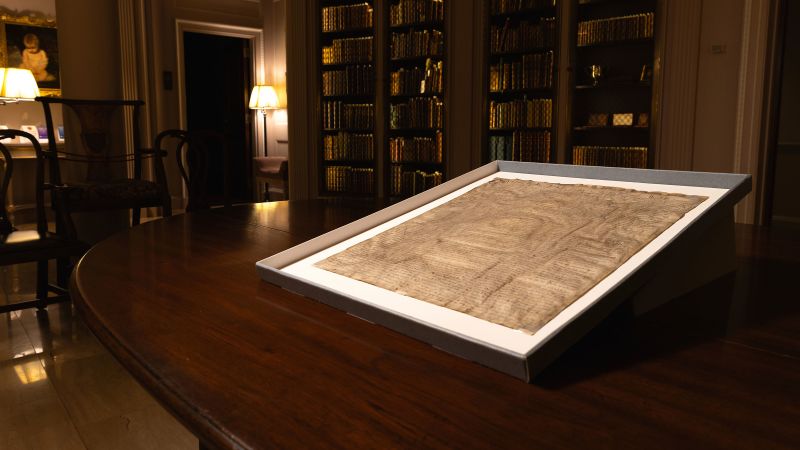In a remarkable revelation that has reshaped historical understanding, a document referred to as a “copy” of the Magna Carta, once purchased by Harvard Law School for a mere $27.50, is now recognized as an exceptionally rare original manuscript from the year 1300. This significant finding emerged after thorough research by British historians who stumbled upon the document while exploring Harvard’s online archives.
The discovery was made by David Carpenter, a professor of medieval history at King’s College London. He shared his experience, stating, “I was just working at home… looking for unofficial copies of Magna Carta and finding quite a lot of them.” It was while investigating Harvard’s manuscript number 172 that Carpenter came across what he initially assumed would be a typical statute book. To his astonishment, he uncovered an original version of the Magna Carta, dating back to 1300.
Realizing the magnitude of this find, Carpenter quickly reached out to Nicholas Vincent, another expert in medieval history at the University of East Anglia. Expressing his surprise, he asked Vincent, “Is this what I think it is?” to which Vincent confirmed his suspicions, acknowledging the document’s authenticity.
The Magna Carta, often referred to as the Great Charter, holds great significance in the history of human rights. It is credited with formally enshrining fundamental rights within English law and is widely regarded as the first legal document stating that the king and his government are not above the law. According to the UK Parliament, the charter initiated the principle of legal accountability, establishing that even monarchs must adhere to legal processes and standards. This principle shifted the dynamics of power, ensuring that arbitrary actions by the King could not dominate individuals without due legal procedures.
Today, the Magna Carta is celebrated worldwide as a foundational text in the establishment of rule of law, underscoring its character as a pioneering document promoting the rights of individuals against government overreach. Carpenter highlighted the essential nature of this document, elucidating that it meant the King could no longer act with impunity, declaring, “He couldn’t just say, ‘off with your head, into prison, I’m seizing your property.’” The advent of legal rights marked a milestone in the fight for individual liberties and has inspired numerous movements across the globe.
Scholars estimate that the Harvard document is one of only seven surviving copies from King Edward I’s 1300 issue of the Magna Carta. Amanda Watson, assistant dean for library services at Harvard Law School, praised the work of the British historians, calling their finding a “fantastic discovery.” She expressed enthusiasm about how such research exemplifies the rich potential of collections like those housed in Harvard Law Library, which can open pathways to new historical insights through the contributions of accomplished scholars.
The document’s journey to Harvard Law School began when it was acquired in 1946 at an auction from the London book dealers Sweet & Maxwell. Initially described in the auction catalog as a “copy…made in 1327… somewhat rubbed and damp-stained,” the document was believed to lack any unique value. However, its lineage is fascinating, having passed through the hands of historical figures, including World War I pilot Air Vice Marshal Maynard who inherited it from prominent abolitionists.
Vincent noted the exceptional authenticity of the document, pointing out distinct indicators such as the original handwriting style, particularly a large “E” at the start of the first line that stands for “Edwardus.” Moreover, the size of the manuscript, measuring 48.9 cm by 47.3 cm, aligns perfectly with the dimensions of known original Magna Carta documents. Advanced techniques, including ultraviolet imaging, enhanced the efforts of researchers to affirm the document’s integrity, leading Carpenter to conclude that it was indeed genuine.
Following this groundbreaking discovery, both scholars plan to visit Harvard in June to commemorate the event, and plans are underway for the document to be publicly exhibited. Carpenter expressed optimism that this significant piece of history will soon be showcased as a monumental treasure within Harvard’s impressive collection of historic manuscripts.



